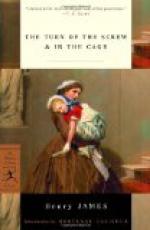That was what the night before, at eight o’clock, her hour to go, had made her hang back and dawdle. She did last things or pretended to do them; to be in the cage had suddenly become her safety, and she was literally afraid of the alternate self who might be waiting outside. He might be waiting; it was he who was her alternate self, and of him she was afraid. The most extraordinary change had taken place in her from the moment of her catching the impression he seemed to have returned on purpose to give her. Just before she had done so, on that bewitched afternoon, she had seen herself approach without a scruple the porter at Park Chambers; then as the effect of the rush of a consciousness quite altered she had on at last quitting Cocker’s, gone straight home for the first time since her return from Bournemouth. She had passed his door every night for weeks, but nothing would have induced her to pass it now. This change was the tribute of her fear—the result of a change in himself as to which she needed no more explanation than his mere face vividly gave her; strange though it was to find an element of deterrence in the object that she regarded as the most beautiful in the world. He had taken it from her in the Park that night that she wanted him not to propose to her to sup; but he had put away the lesson by this time—he practically proposed supper every time he looked at her. This was what, for that matter, mainly filled the three days. He came in twice on each of these, and it was as if he came in to give her a chance to relent. That was after all, she said to herself in the intervals, the most that he did. There were ways, she fully recognised, in which he spared her, and other particular ways as to which she meant that her silence should be full to him of exquisite pleading. The most particular of all was his not being outside, at the corner, when she quitted the place for the night. This he might so easily have been—so easily if he hadn’t been so nice. She continued to recognise in his forbearance the fruit of her dumb supplication, and the only compensation he found for it was the harmless freedom of being able to appear to say: “Yes, I’m in town only for three or four days, but, you know, I would stay on.” He struck her as calling attention each day, each hour, to the rapid ebb of time; he exaggerated to the point of putting it that there were only two days more, that there was at last, dreadfully, only one.
There were other things still that he struck her as doing with a special intention; as to the most marked of which—unless indeed it were the most obscure—she might well have marvelled that it didn’t seem to her more horrid. It was either the frenzy of her imagination or the disorder of his baffled passion that gave her once or twice the vision of his putting down redundant money—sovereigns not concerned with the little payments he was perpetually making—so that she might give him some sign




